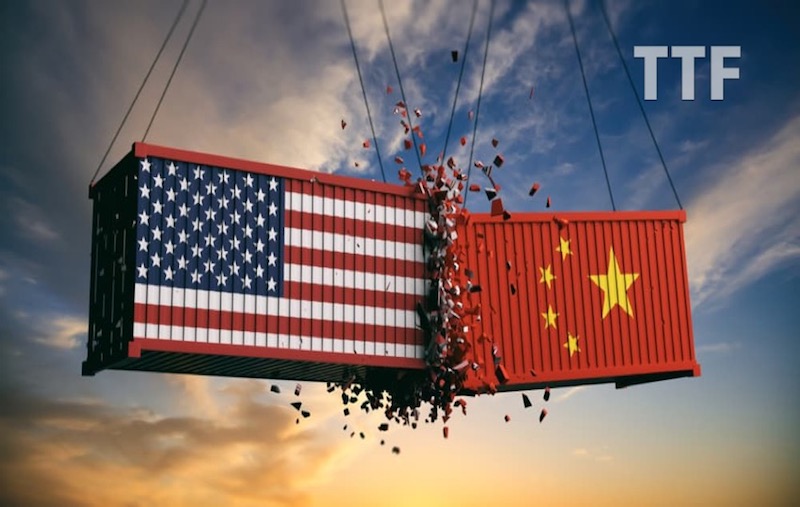
“Can Anwar protect Malaysia’s interests by denying the United States a ‘security’ presence in the Straits of Malacca? I don’t think so, and judging from how Anwar practically rolled out the red carpet for the International Monetary Fund and reports of Republican figures as well as former top US intelligence officers working with the Malaysian opposition since 2002, his premiership is too much of a gamble for the country”
Raggie Jessy Rithaudeen
ساتو سبب كوكوه كناڤ انور تيدق بوليه ككال ڤي عيم باڬي تيمڤوه لاما
UNTUK BERITA TERKINI, SERTAI TELEGRAM TTF DI SINI

China has one thing all western nations lack – a bloated population hovering at 1.4 billion people, ballooning at an unimaginable rate.
This means, the Chinese government is self-contained economically as long as it manages to keep the middle class segment sufficiently large.
This is why the Chinese were able to roll out a “dual circulation” policy following the trade war between the United States and China.
Essentially, the Domestic-international dual circulation is a Chinese government strategy to reorient the country’s economy by prioritizing domestic consumption (internal circulation) while remaining open to international trade and investment (external circulation).
A mouthful?
Well, let’s take things a step back and begin by understanding what the middle class segment is all about.
The Role of the Middle Class in Economic Development
A larger middle class influences growth primarily through higher levels of human capital investment.
In simpler terms, the middle class tends to invest more in human capital, and because of this, there is a tendency for steady employment.
When you have steady employment, more and more entrepreneurs emerge, and entrepreneurs from the middle class are know to foster innovation and growth.
Why?
Because a large majority of middle class entrepreneurs stray away from monopolies by entrepreneurs from the upper class and seek their own niche.
It is also because the middle class employees – from where the middle class entrepreneurs come from – save more money and often change jobs for higher prospects.
As a result, there is diversification of knowledge and skills, and the ambitious ones tend to fill up their piggy banks to the brim.
When there is enough money, they start their own businesses.
Of course, you will have failures, but if the middle class is large enough, you will also have many successes.
This ultimately expands the job market and supports a growing economy, further increasing and diversifying the middle class.
It follows, a large middle class has a positive influence on economic growth.
Over time, when the middle class is strong enough, there will be too many people with sufficient purchasing power and a large pool of local entrepreneurs with the capacity to cater to most domestic demands.
As a result, less money will flow out of the country and more foreign currencies will flow in, primarily due to the desire of foreign manufacturers to compete for a piece of the market share.
That, in essence, is the long and short of why China – the largest middle class consumption market in the world and a top priority for major multinational firms – is a boon to South East Asia and a threat to the United States.
Why is China a Threat to the United States?
China’s middle class grew explosively in the past 20 years.
In 2000, roughly three per cent of the country’s population was classified as middle class.
By 2018, that number snowballed to more than half of China’s population.
That’s 700-odd million people who entered the country’s middle-income bracket in 2018, according to calculations from the Centre for Strategic and International Studies that defined the middle class as those spending between USD$10 and USD$50 a day.
As China’s middle class exploded, it began to look like that of the United States.
However, China’s middle class accounts for more than double of the entire American population.
When you have a middle class that large, not only do you become the world’s strongest middle class consumption market, you end up setting trends that economies around the world follow.
Naturally, big time manufacturers from the United States wanted a piece of China’s middle class cake and rushed there to sink their teeth into it.
As a result, the American dollar reached China faster than you could say “oh my God,” and the joke is, the Chinese government translated a lot of that money into US Treasury Securities – a whopping USD870 billion, to be precise.
That means, not only is China helping fund day to day operations in the United States, the Chinese are using a very large chunk of the United States’ own dollars to keep the western giant indebted!
See the problem?
This is just one of the many, many issues the United States has with China, and this alone is reason enough for the United States to want a presence in the Straits of Malacca.
Why the Straits of Malacca?
There are a hundred and one reasons, and the supply of oil to China is one of them.
Basically, the United States wants to make it insanely difficult for oil and gas vessels from around the world to supply oil to China.
And I’m not making this up.
In 2003 and 2004, the United States proposed a Regional Maritime Security Initiative that clumsily attempted to unify various projects, purportedly to improve South East Asia’s cooperation and action against non-state maritime threats.
This happened during Tun Abdullah Badawi’s tenure as Prime Minister and was loudly objected by both the Malaysian and Indonesian governments, citing concerns regarding the United States’ intent to violate their sovereignty.
Although the name of the initiative was swiftly taken out of use, there isn’t a doubt in my mind that the United States is keen on furthering the agenda.
I am made to understand, the United States aims to impose some form of “anti-terrorism security tax” within the Straits of Malacca in the long run, purportedly to ‘protect’ “high-risk” trade that would most certainly include oil and gas.
Where there is oil, there is the United States, and the Americans know that a lot of oil transiting through the Straits of Malacca is destined for China.
Fact is, China has already overtaken the United States as the world’s biggest crude importer, and more than 90 percent of crude oil volumes flowing through the South China Sea transits the Strait of Malacca, making it one of the world’s primary oil transit chokepoint.
The “anti-terrorism security tax” will be a way for the Americans to suck money out of the Chinese and present huge problems for the Chinese economy.
Question is, should the United States revive the Regional Maritime Security Initiative, does Datuk Seri Anwar Ibrahim have the guts to tell them to go fly kites?
I personally don’t think so, because to me, Pakatan Harapan is beholden to the United States for helping Anwar over the years.
This is precisely why Malaysia cannot afford to keep Anwar as Prime Minister – Anwar has strong ties with people in the Indonesian government, and the United States may use him to get consent from Indonesia and the Malaysian government to exert security control over the Straits of Malacca.
That would immediately turn Malaysia into a “Chinese problem,” and I won’t be surprised if China decides to reevaluate its commitments towards Malaysia in the blink of an eye.
Tell me, would that not deal a huge blow to our already flagging economy?
We’re practically at China’s doorstep, and we’re likely to reap benefits from the escalating China-US trade war.
China has already invested heavily into Malaysia’s automotive and infrastructure industries, and things are looking very good for further joint venture initiatives.
Imagine if China were to commit even one per cent of the USD$870 billion it has in the United States towards projects in Malaysia – would that not help strengthen the Malaysian ringgit and economy?
One way to go about it is to embark in deep sea drilling with China near the Malaysian side of the South China Sea via joint venture initiatives involving the Chinese government and Petronas.
China has developed very advanced deep sea drilling technology, and the Chinese government would most certainly be interested in partnerships that benefit both Petronas and China.
Who knows, China may even commit up to five per cent of the USD$870 billion it has in the United States towards a joint venture initiative over a span of, say, ten years, and that would be a very large feather in Anwar’s cap.
Of course, if you want all this to happen, you will have to protect China’s oil and gas interests in the Straits of Malacca.
Question is, can Anwar protect China’s oil and gas interests in the Straits of Malacca?
More importantly, can Anwar even protect Malaysia’s own interests by denying the United States a ‘security’ presence in the Straits of Malacca?
I don’t think so, and this precisely why Anwar’s premiership is a liability to Malaysia.
This may be my opinion, but judging from how Anwar practically rolled out the red carpet for the International Monetary Fund and reports of Republican figures as well as former top US intelligence officers working with the Malaysian opposition since 2002, his premiership is too much of a gamble for the country.
To be continued…



